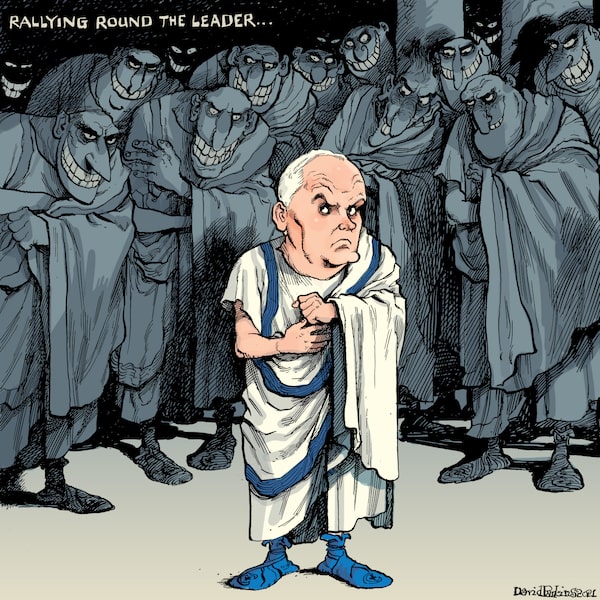Good morning,
Michael Kovrig and Michael Spavor’s emotional return to home soil after 1,020 days of arbitrary detention was warmly embraced by Canadians this weekend, but their ordeal will have long-lasting implications on Canada’s relationship with China.
Kovrig and Spavor touched down in Canada very early Saturday morning after nearly three years apart from their families. The two were greeted in the dark and hugged by Prime Minister Justin Trudeau on the tarmac at Calgary International Airport.
They were accompanied on their flight home by Dominic Barton, Canada’s ambassador to China. Spavor stayed in Calgary while Kovrig proceeded to Toronto, where he was met by his wife, Vina Nadjibulla. Kovrig told reporters he was “immensely grateful” to everyone who worked so hard to ensure their return.
Guy Saint-Jacques, former Canadian ambassador to China, told The Globe and Mail on Sunday that it will be “impossible” for relations with China to revert back to normal, adding that trust between the two countries is gone and will take years before it can be repaired.
More coverage of the two Michaels’ homecoming:
- Campbell Clark: Beijing finally releases two Michaels, but a hard lesson can’t be forgotten
- Meng Wanzhou lands in China with fanfare after release from Canadian custody
- With the two Michaels now free, Canada must decide if a Huawei 5G ban is next
Michael Kovrig and Michael Spavor, accompanied by Canada's ambassador to China, Dominic Barton, are greeted on arrival by Prime Minister Justin Trudeau after being released from detention in China, in Calgary, Sept. 25, 2021.CANADIAN FORCES/Reuters
This is the daily Morning Update newsletter. If you’re reading this on the web, or it was forwarded to you from someone else, you can sign up for Morning Update and more than 20 other Globe newsletters on our newsletter signup page.
In close German election, Olaf Scholz’s Social Democrats narrowly defeat Angela Merkel’s conservatives
Germany’s centre-left Social Democratic Party narrowly defeated the governing conservatives in Sunday’s national vote.
The Social Democrats’ chancellor candidate, Olaf Scholz said he aimed to build a coalition with the Greens and the liberal Free Democrats (FDP), saying Germans had voted to send Angela Merkel’s conservatives into opposition after 16 years in power.
The SPD won 25.7% of the vote, ahead of 24.1% for Merkel’s CDU/CSU conservative bloc, according to provisional results. The Greens came in at 14.8% and the FDP were on 11.5%.
Kids spared from worst of COVID-19, but Delta variant raises fears, experts say
New research shows that the majority of Canadian children and teens didn’t experience the most severe symptoms of COVID-19 in the first phase of the pandemic. But health experts say that the more transmissible Delta variant could expose high numbers of vulnerable young people to the virus and lead to more serious cases.
The study, which comes just after millions of unvaccinated children returned to school and resumed extracurricular activities, found that pediatric hospital admissions linked to COVID-19 were low from March to December, 2020.
About 44 per cent of children who were in hospital with COVID-19 had been admitted for reasons unrelated to the coronavirus, according to the study, published in the Canadian Medical Association Journal. Some cases, for example, were detected through routine testing before a planned procedure.
More COVID-19 coverage:
- Tax and Spend: Ottawa’s pandemic spending spurs tax-revenue windfall in Ontario
- Absentee rates at Alberta schools soar, but the government refuses to disclose COVID-19 numbers
- As provinces enact vaccine-passport rules, small businesses are left to enforce them
Got a news tip that you’d like us to look into? E-mail us at tips@globeandmail.com Need to share documents securely? Reach out via SecureDrop
ALSO ON OUR RADAR
Ottawa’s offer to help end battle over old-growth logging insufficient, B.C. says: With the Liberals returning to office, Environment Minister Jonathan Wilkinson said Ottawa is ready to write a $50-million cheque aimed at helping resolve the continuing conflict over old-growth logging. But B.C. Premier John Horgan has dismissed the amount on offer, saying it “would be a very small amount of money relative to the consequences to the forest industry, to communities and to workers.” He said the addition of another zero to the proposed fund would be a starting point.
Canada’s Top-Growing Companies 2021: Meet this year’s crop of trendsetters: From Canada Pooch, which creates threads made to endure the Canadian winter for dogs, to Article, a Vancouver furniture retailer that has put customer convenience at the focus of its brand, these companies are fashioning a blueprint for success even amid the pandemic.
Swiss voters support same-sex marriage in referendum: Switzerland joined much of Western Europe on Sunday, voting by a wide margin in a referendum to allow same-sex couples to marry. Official results showed that the “Marriage for All” measure garnered 64.1 per cent in support and won a majority in all of Switzerland’s 26 states. Same-sex civil partnerships have been allowed since 2007.
The death of profit: Why investing feels broken, and markets no longer make sense: Investors have been funnelling massive amounts of cash at money-losing companies in a bid to discover the next Amazon or Shopify. But how long can the party last?
Listen to The Decibel: The four-lane bridge that separates Del Rio, Texas, from Acuña, Mexico, was unremarkable as far as border crossings go. But for most of September, and up until Friday, the scene had been transformed into a refugee camp of sorts, as thousands of migrants gathered in hopes of getting into the United States. The Globe’s Nathan Vanderklippe went to visit the camp, where he spoke to Haitian migrants, many of whom travelled for months from South America. They now face the prospect of being deported back to their homeland.
MORNING MARKETS
World markets gain: World shares rose on Monday, led by sharp gains in energy shares as crude oil prices jumped while European stocks firmed after Germany’s election results ruled out chances of a purely left-wing coalition. Just before 6 a.m. ET, Britain’s FTSE 100 rose 0.39 per cent. Germany’s DAX and France’s CAC 40 were up 0.91 per cent and 0.59 per cent. In Asia, Japan’s Nikkei finished down 0.03 per cent. Hong Kong’s Hang Seng added 0.07 per cent. The Canadian dollar was trading at 79.02 US cents. New York futures were higher.
WHAT EVERYONE’S TALKING ABOUT
Conservatives must solve their suburban conundrum
“Both parties suffer as the rural-urban rift grows. The Liberals lose access to MPs who share the values and perspectives of rural folk. But the Conservatives lose much more: an intimate connection to the needs and wants of suburban voters, and with it the hope of winning elections.” - John Ibbitson
I was asked to apologize for my question in the leaders’ debate. I stand by it unequivocally
“Given the chance, politicians will often evade questions, stick to talking points, ignore what they’re asked and switch to what they want to say instead. When that doesn’t work, some attack the questioner. The past decade has crystallized this approach.” - Shachi Kurl, president of the research foundation Angus Reid Institute
All Canadians should take Sept. 30 to observe National Truth and Reconciliation Day
“Put on an orange T-shirt to honour the survivors of those 139 so-called schools. Think about how Canada can bring about change. Reflect on how to bring loving homes free of mould and with clean water and full fridges to all First Nations communities that need them. Or high schools, for that matter.” - Tanya Talaga
TODAY’S EDITORIAL CARTOON

David Parkins/The Globe and Mail
LIVING BETTER
After over a year of living in soft pants, we now want the same comfort from our decor – but with an element of chic
With the onset of fall and winter, we’re not just reaching for “soft pants” to keep us comfy – it seems we want to live inside them.
Trend forecasters and retailers appear to have taken note. The latest home furnishings and accessories hitting the shelves aim to make a laid-back lifestyle more stylish than ever. Fall’s most coveted pieces have taken our longing for loungewear and elevated it with furniture and accessories fabricated in chenille, corduroy, bouclé and velvet, writes Beth Hitchcock.
MOMENT IN TIME: The evolution of the multiplex cinema

Famous Players's new multiplex movie theatre in Richmond, B.C., not only had 12 screens, but it also had restaurants, a bowling alley and an athletic centre where visitors watched the Vancouver Grizzlies practice. Movie goes make their way up flight of stairs to enter theatres, Jan. 12, 1998.Christopher Grabowski/The Globe and Mail
For more than 100 years, photographers and photo librarians have preserved an extraordinary collection of 20th-century news photography for The Globe and Mail. Every Monday, The Globe features one of these images. This month, we’re looking at moviegoing.
A multiplex is a facility with a number of screens within a single building. While it’s hard to nail down the first multiplex, a frequently cited innovator is Canada’s Nat Taylor, who twinned his 800-seat Elgin Theatre in Ottawa with the 350-seat Little Elgin in 1947. Mr. Taylor later co-founded the Cineplex Odeon cinema chain with theatre producer Garth Drabinsky. In 1979, the debut Cineplex location at the Toronto Eaton Centre had 18 screens.
By the late 1990s, rivals in the movie-theatre business were competing to offer the biggest and most multifaceted cinema experience. For example, a new Famous Players multiplex in Richmond, B.C. (shown above on Jan. 12, 1998), boasted 12 screens, a bowling alley, multiple restaurants and an athletic centre where visitors could watch the NBA’s Vancouver Grizzlies practice. Brad Wheeler
Subscribers and registered users of globeandmail.com can dig deeper into our News Photo Archive at tgam.ca/newsphotoarchive.
Read today's horoscopes. Enjoy today's puzzles.
If you’d like to receive this newsletter by e-mail every weekday morning, go here to sign up. If you have any feedback, send us a note.